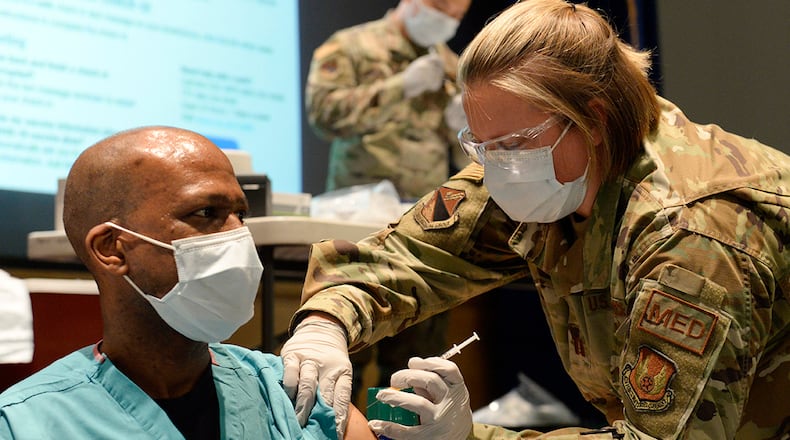The vaccine is not mandatory for Wright-Patt personnel. But base doctors have administered about 5,000 vaccines so far, the second highest number within the Department of the Air Force.
The stakes are high for the base. Not only is Wright-Patterson a crucial military installation, housing many of the Air Force’s key research and logistics missions, it’s also Ohio’s largest single-site employer, with some 30,000 military and civilian employees tied to the installation.
The stakes are high for individuals, as well. Maj. Evan Fisher, a base nephrology physician, warned viewers about the severe side effects of COVID, with the virus in some cases damaging lungs and kidneys, with even younger patients forced to resort to dialysis after suffering impaired kidney function.
“I’ve seen kind of the sickest of the sick ... some of these patients have been 20-year-olds who did not have any other issues before getting sick” with COVID, Fisher said.
Theis said she has seen patients who, even if they weren’t hospitalized, found themselves still fighting for breath months after contracting the virus.
During an hour-long Facebook live event at the base Thursday, the medical panel spent a majority of the time answering questions and urging viewers to consider the vaccine. Little was said about the timing of vaccine distribution.
“It is truly dependent on how much the DoD (Department of Defense) sends to Wright-Patt at any given time,” Kristen Van Wert, a spokeswoman for the 88th Medical Group, told Facebook viewers in the video’s comments section. “We are moving through our allotted supply quickly and we hope that this increases our supply in coming months.”
“I guarantee you, we’re not sitting on them (vaccine doses), folks,” said Col. Michael Phillips, deputy commander of the 88th Air Base Wing.
The DoD plan for vaccine distribution is opening to gradually accommodate those who are 75 years and older, with the next round of vaccines aimed at that age-group, and others who had been eligible for the vaccine earlier, Col. Patrick Miller, commander of the 88th Air Base Wing and Wright-Patt installation commander, said Wednesday.
Beneficiaries who are 75 or older have started to receive automated phone calls asking if they’re willing to take the vaccine, Col. Jason Musser, deputy commander of the 88th Medical Group, also said Wednesday. From that list of willing recipients, the first appointments in that age group are being made.
In Thursday’s Facebook Live event, Maj. Devin Kelly said the Pfizer vaccine is administered with two doses three weeks apart. The vaccine has been “95% efficacious” with a wide range of the population, including older patients. “Overall these vaccines are very efficacious ... and that is pretty astounding for vaccines as a whole,” he said.
About 73,000 patients underwent trials with Pfizer and Moderna, said Maj. Kathryn Burtson. Even in cases of compromised immune systems, the vaccine still stimulates a response, panel members said.
And about 23 million Americans have received the vaccine as of Thursday, panel members noted.
Kelly said the vaccine is expected to be able to handle COVID variants that have been seen in the United Kingdom. But there is “some concern” that the vaccine may be less effective against the disease’s South African variant.
About the Author


